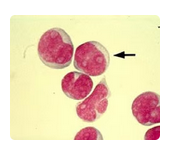The term universal precautions refers to:
A. treating only CERTAIN specimens as infectious.
B. mixing organic chemicals under a hood.
C. wellness clinic available to everyone.
D. universal blood donors.
Which of the following hormones stimulates gluconeogenesis, the formation of glucose from noncarbohydrate sources such as amino acids, glycerol, and fatty acids?
A. Insulin
B. Epinephrine
C. Cortisol
The mandatory waiting period between blood donations is 56 days, or eight weeks. The accepted interval between blood donations is:
A. 12 weeks
B. 8 weeks
C. 6 weeks
D. Depends on hematocrit level
Allergic reactions, bacterial/viral meningitis do not cause the presence of blasts to be noted
in the CSF. Leukemia with CNS involvement will show immature cells, similarly to the
peripheral blood smear.
The image is a stained smear of cerebrospinal fluid. The cells present in this field may
indicate what condition?
A. allergic reaction
B. bacterial meningitis
C. leukemia with CNS involvement
D. viral meningitis
AABB Standards do not require a DAT, autologous control, or a minor crossmatch for pretransfusion testing. Essential components of compatibility testing include all of the following except :
A. Antibody screen on recipients serum
B. Major crossmatch or computer crossmatch
C. ABO and Rh typing of recipient
D. Direct Antiglobulin Test (DAT)
Parathyroid hormone regulates serum calcium by acting on bone, kidney, and intestines
while regulating phosphate by stimulating the intestines and the kidneys, enhancing
absorption and reabsorption respectively.
Chem
The parathyroid hormone is important in the regulation of:
A. iodine and bromine
B. calcium and phosphate
C. acid and alkaline phosphatase
D. zinc and magnesium
The disc diffusion method for antibiotic susceptibility testing is the Kirby-Bauer method. The
agar used for this procedure is Meuller-Hinton.
Which of the following media is commonly used when performing the Kirby-Bauer disk
diffusion?
A. Chocolate agar
B. Mueller-Hinton agar
C. Thayer-Martin agar
D. MacConkey agar
Convert the following temperature from Fahrenheit to Celsius 102 degrees F
A. 38.9 degrees C
B. 14 degrees C
C. 77 degrees C
D. 39.2 degrees C
The division of Department of Health and Human Services (DHHS) responsible for protecting public health by ensuring the safety and efficacy of foods, drugs, biological products, medical devices, and cosmetics is:
A. Health Insurance Portability and Accountability Act (HIPPA)
B. the Joint Commission
C. Food and Drug Administration (FDA)
D. Clinical and Laboratory Standards Institute (CLSI)
Cholesterol levels do not fluctuate as triglycerides, fatty acids, lipoproteins, and chylomicrons do after an individual eats a meal. This is the reason that patients are told to fast; the laboratory needs a fasting sample to determine a lipid profile or panel which includes the latter four components. Which of the following lipid tests is LEAST affected by the fasting status of the patient?
A. Cholesterol
B. Triglycerides
C. Fatty acids
D. Lipoproteins
E. Chylomicrons
Failure to tightly seal specimens for sweat electrolytes during collection and transport will cause:
A. decreased values due to exposure to air
B. decreased values due to exposure to light
C. increased values due to evaporation
D. increased values due to cellular contamination
The conidia of Exophiala species are produced within phialides that extrude the conidia in
tight, ball-like clusters.
The large, drum stick-shaped muriform macroconidia of Alternaria species are arranged in
short chains; the small, elliptical conidia of Cladosporium species are arranged in both long
and short, branching chains.
Which of the following dematiaceous fungal species produce conidia in clusters?
A. Alternaria species
B. Exophiala species
C. Cladosporium species
| Page 15 out of 47 Pages |
| Previous |